Continuum // DB1
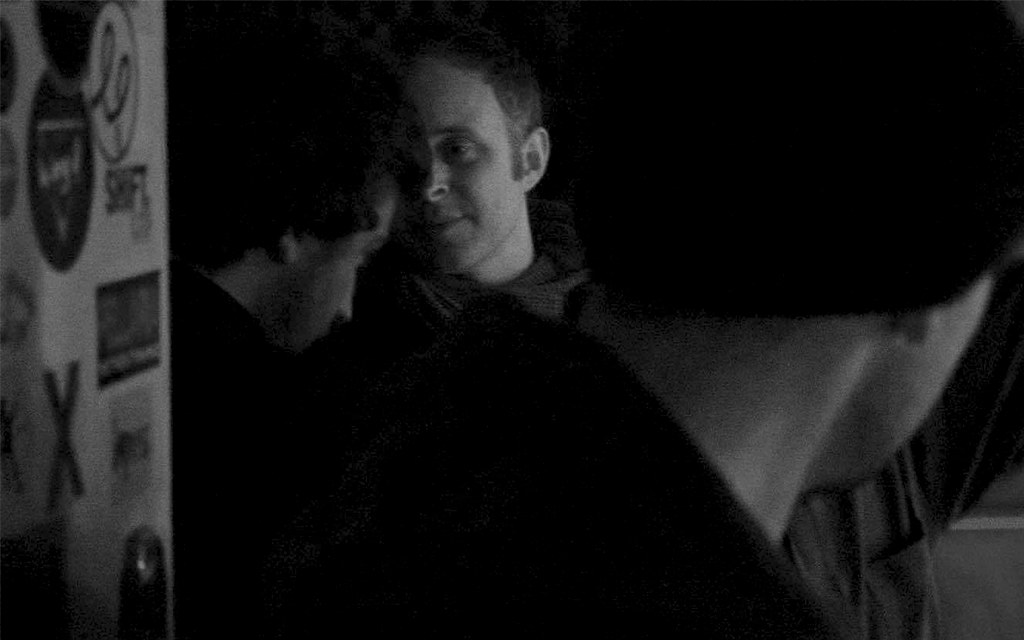
Photo by Paige Ofosu.
Hidden Hawaii are a rare breed of label. The strongest indicator of their sound would be to term it as a drum & bass imprint, yet your typical D&B fans would likely feel as though you'd tried to miss-sell them something presented with this descriptor. While many of the records utilise high tempos, dizzying poly-rhythms and tectonic surges of low-end, you won't find any hype MCs or double-drops here.
I first happened on the label back in 2015 after over-saturating myself with dub-techno. Hidden Hawaii seemed somehow linked to the lineage of labels like Chain Reaction, yet their amalgamation of electronic-dub, D&B and ambient also seemed a refreshingly novel combination.
Run by Felix K, Wan.2 and a number of others, maintaining this distinct style necessitates keeping the circle tight. There are plenty of repeat offenders on Hidden Hawaii, one of my favourites being London-based Dylan Brownsword, aka DB1. Brownsword debuted on Hidden Hawaii LTD in 2012, contributing 'Vanguard' - a decidedly off-kilter percussive exploration into dub and D&B - to a split-12" with Martsman.
Since then he has released exclusively on Hidden Hawaii and it's assorted sub-labels. This culminated in his debut album unleashed last month, Zwischenwelt. The record sees Brownsword at his most freeform and exploratory yet, mixing the faster tempos we have come to expect from him with some wickedly unconventional takes on techno - from the skidding, scuba dive textures of 'Zukr', to the caustic, 'Drft Part 2'.
Given its release last month, we decided to catch up with Brownsword to discuss the album, soundsystem culture and growing up with '90s hardcore.
Zwischenwelt, your debut LP was released last month. Tell me a bit about the album - how long had it been in the making?
I went to Berlin at the end of 2015 for two months with all the modular stuff. I was over there just jamming and making loops. Basically I made a lot of stuff, a lot of it wasn't really great but there were a few things I really liked. I spent about two months when I came back to the UK mixing the tracks and making them a bit better formed. It was made across two months and then polished across two months.
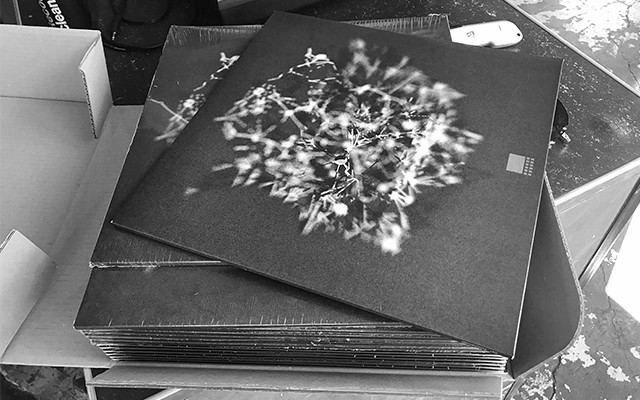
Vinyl copies of Zwischenwelt.
Did you know you wanted to do an album when you started or was it another EP that got out of control?
It was definitely designed as an album. Felix signed 'Vanguard' in 2010, then it was released as a 12" in 2012. He was like "it'd be great if you could make an album", but that was back when it was taking me like a year to finish a track so I was a bit like "you've got to be joking" - there's no way that's going to happen. But getting into modular and having a bit more of a focused workflow; I kind of thought at that point I can make an album around that. I wanted to make tracks that fit with one another and feel connected. The stuff I make is on a certain vibe anyway, it's not like I had to tame my liquid side to go and make some weirder stuff (laughs).
It was partly because I'd just finished a job and was at a point where I could go and do that, it was an opportunity.
On a related note I saw you have this mod_85 account on Soundcloud. Did you start that when you were getting into modular stuff?
Yeah. It was partly inspired by Martin [Thompson]'s one track a day thing. Getting stuff up there quickly. I think what was quite good with that was at the start of the process I had quite a classic D&B philosophy that a track should be highly produced and have these elements which all sit to create this slick thing. But putting those up and talking to people like Martin kind of make you think that a track can just be a couple of elements that just sound good together.
I think I will probably try and do more of that mod_85 stuff. It's quite nicely throwaway. If someone told me one of those tracks was really shit it wouldn't bother me because they took like 30 minutes each, but if someone said a track on the album was really shit I'd be a bit like... damn (Laughs).
I think also when you make stuff on that kind of format, when you listen back things that you didn't think sounded great sound quite cool. It gives you a new perspective on your work. It's also just good fun and a good excuse to take photos of the modular!
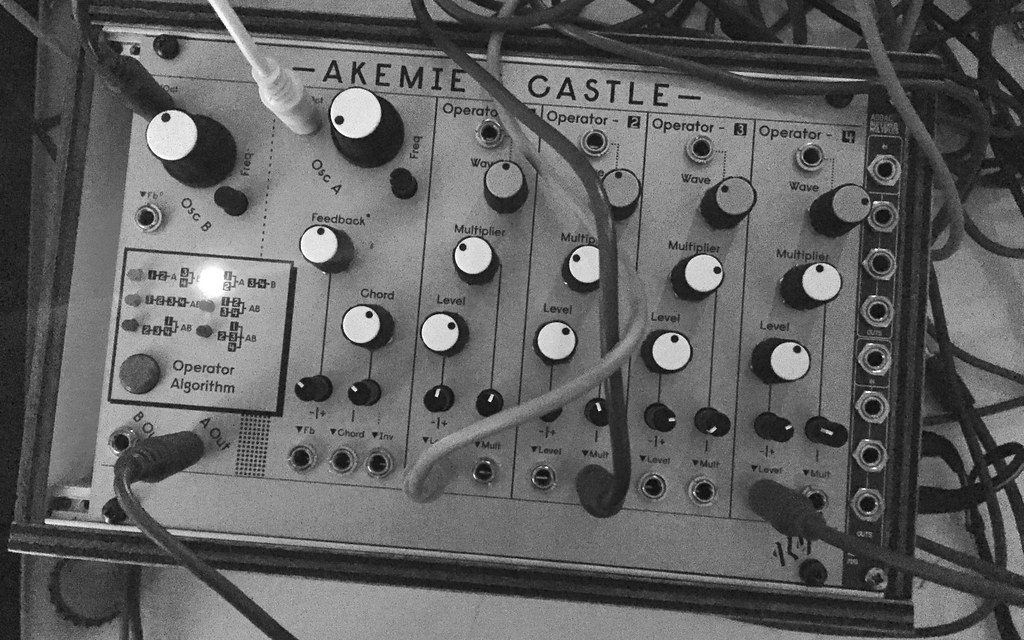
Brownsword's Akemie Castle.
Where does the album title come from too? It translates as 'the in-between world' right? Does it have any reference to the group on Rephlex?
We saw that ages after the album! It translates as 'limbo' too. There's is an artist name whereas mine is an album name so I think it's fine. The name's a summation of a few things. Hidden Hawaii's not really techno and not really D&B, it's a mixture of the two. Also I guess I was very much from London but living in Berlin when I wrote it which felt quite weird. It was fun but strange not being at home and knowing many people. Also with the sound of the album, what I wanted to get to was not having obvious sounds that you can hear - I wanted it to be quite hazy. The vibe is a little bit obscured.
What was cool was when Sebastian Manger did the artwork, I sent him a super vague description and he came back with that image straight away. It was exactly what I was trying to get at. I didn't want to get into the whole thing of asking him to change colours and stuff, because I don't really know about artwork. It's nice what he came up with, a bit in focus, a bit out of focus; you can see it's something but aren't quite sure what. I spent a bit of time trying to work out what it was, then told myself to never try and figure it out as it would spoil the whole thing!
I also thought it had a mix of looking quite organic but also very geometric in some ways which really fits with the Hidden Hawaii sound."
I think sometimes it looks like a dandelion, then other times I think it looks like DNA or something. But then I think the moment you decide on something it kind of spoils the ambiguity.
How did you first meet Felix and get involved with the label?
It must have been about the mid-00s. There was a label called Bassbin Records which was an Irish D&B label, but there was a link to Technicality and that whole scene. Felix came over to a few parties in London around that time and I met him through friends, and also Phillip who is on the label.
Around the same time I started going to Berlin quite a lot to techno things. Felix has always been a super friendly guy and would invite me round his house and cook me food, so it was kind of that really.
So you've been going between Berlin for a while?
Around that time everyone in London discovered you could go to these amazing parties in Berlin and it was a bit more open; you could go to Berghain and stay there til 2pm. That kind of thing wasn't really happening in London and it probably still isn't. So me and a few friends including James [Parker aka Logos] used to go over there quite a lot and party. I then got to know Felix quite well through that.
It's interesting because he used to come to London a lot, but he doesn't so much now. I feel like the cultural interest has moved a bit. London was quite a happening place maybe if you weren't so interested in just techno. But now it feels like the focus is really on Berlin.
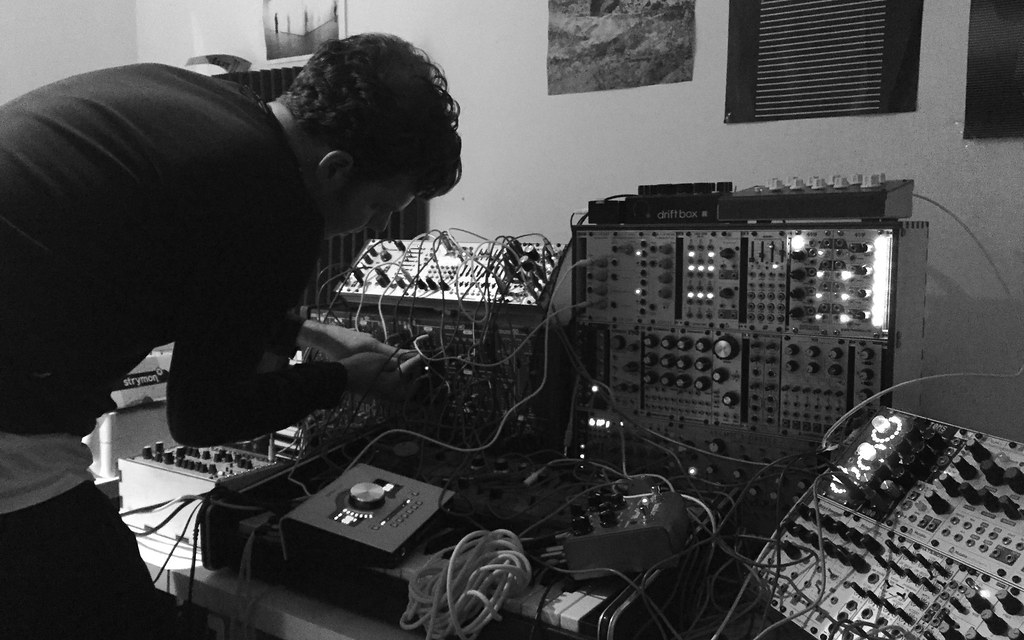
Felix K in Brownsword's London studio.
Were you into D&B from the early days then?
Yeah - I was into hardcore as a teenager. I lived on the edge of London, near Essex. It was a real hardcore place. When that turned into D&B I just sort of followed that. There is that continuum that you go on; grime and garage never really entered into that for me. But dubstep I was really into. I have always followed D&B really, even when everyone says it's shit and dead, there's always good music if you dig around for it.
Did you used to go to dodgy raves of the motorway and that kind of thing? What was the first D&B party you went to?
(Laughs) I think those days were before my time. I think the first thing I ever went to was at Labyrinth in Dalston. It was fucking insane and actually fairly scary. There were bouncers with necks like the same size as their heads.
I'm imagining Dalston wasn't quite the same as it is now...
Yeah imagine a totally different place! (Laughs) Anyway that was cool and then I used to go to a lot of raves like Desire and things like that. Just big raves. But then at some point you realise every DJ is just playing the same ten tracks over and over again. After that was when I got into Metalheadz and Blue Note and all that kind of thing - the more overtly experimental side of things...
In the '90s D&B and hardcore was really everywhere, and a lot of my friends had this thing where they grew up and got into house music and garage music because it was seen as more mature. I really like some of those styles, especially US house music, but I never quite managed to give up on the faster stuff.
Jungle just sounded more exciting at the time and D&B also seemed more exciting. I think for me around '98 with Ed Rush & Optical and all that sort of thing I was just going out every weekend to see the most amazing music and it was really really good.
Did you start playing out when you did the DB1 project or were you playing out before?
I ran a night with James for about four or five years that had a license til 6am. We would go and get pissed and no-one would be there til 1am. Then a load of drunk people would turn up and dance to whatever you played them! It was quite sweet really. You could get away with playing some quite experimental stuff just because everyone was a bit fucked and not too bothered. It was at The Castle in Whitechapel. It still exists but I think it's a bit more organised now.
That was really good fun, but I think DJings a hard one because the music I play, I'm not sure there's a massive crowd that would want to hear it. It's fine if you're a producer and you make an obscure track, send it out and everyone goes that's a bit weird, because you haven't really lost anything. But when you're a DJ and you play obscure stuff and everyone's looking at you going "that's really fucking weird!"
Three minutes starts feeling like a very long time...
(Laughs) Yeah, and then you're thinking what have I got that's got a big drop in it that I can play... So even though I've mixed records, and played out quite a lot, DJing to me is way less interesting than producing because the limitation of what you can do with it is really restrictive. I listen to a lot of reggae music as well and when I go and see someone like Jah Shaka, he just plays what he wants to play and the crowd is very open to whatever he wants to do. The electronic music crowd in London today aren't really, they've got strong expectations.
I was wondering whether the dub influence in your work comes from dub techno - Rhythm & Sound and that kind of thing or actual dub.
Probably a bit of both to be honest. I think dub pre-dated my interest in Chain Reaction. Dub was a massive part of jungle and being really into jungle was like trying to discover where all these samples were coming from. They're also linked by soundsystem culture and dubplate culture, rewinds and stuff. But when I used to hear dub it kind of made sense to me because I had an interest in jungle and then Chain Reaction was a very techno way of presenting that. It so much less edgy and rude, it's more slick.
It's kind of a bit of both but what I'm trying to do is not just make a dub influenced track with someone shouting 'jah' in it - it's more to understand where it's coming from sound-wise.
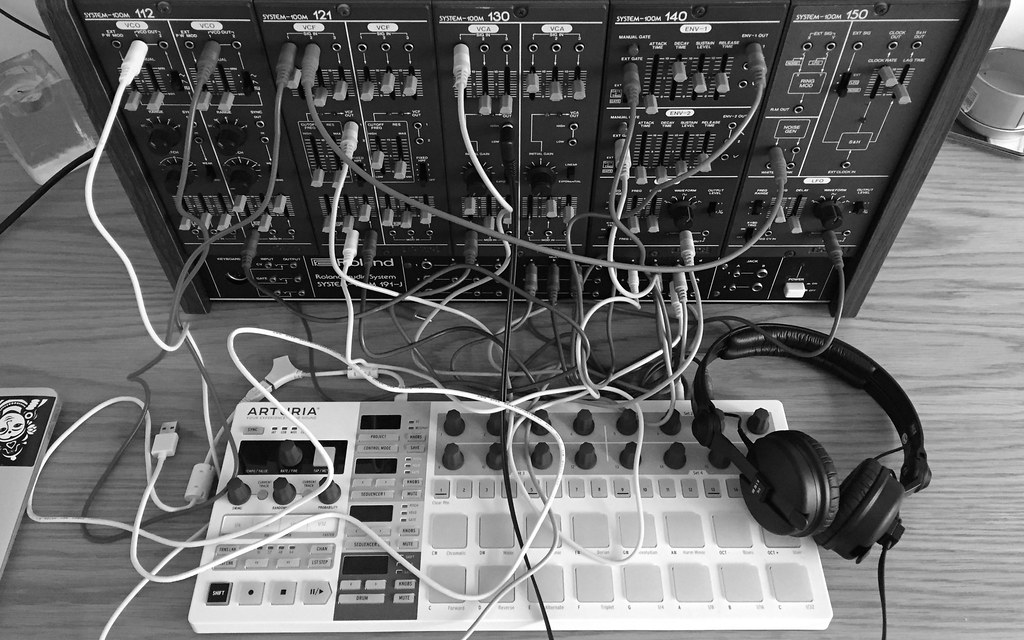
A condensed version of Brownsword's studio.
I enjoyed your set at Happened a couple of months ago. Is the modular you brought to that typical of how you work in the studio?
Essentially it's about a third of the stuff that I have. Within the setup there's stuff that I use a lot, and stuff that I use less frequently. Because I wasn't going down a massively experimental drone and clicks route, what elements would I need to cover for the show?
I think the danger with modular is it's a total addiction. At least ten percent of the stuff I've bought I've never used! You just have those moments of going "oh cool I'll order that" so actually you can focus it down quite quick. When I was in Berlin, the stuff I did with Felix, I had like six rows of modular in the apartment I was staying in but I only really took one row because it wasn't feasible to take more without it getting damaged. I actually got a lot out of taking less because you really focus in on what the bits that you've got can do and it kind of pushes you in a different direction.
When you did the 'Elemnt' project with Felix that was a combination of both your gear?
Yeah, that as Felix using a lot of his stuff, like the Octatrack, Analogue Rhythm, that kind of thing and me with a small amount of modular, a sequencer, a synth and five or six other modules to go on the side of it. I think the good thing about that is the equipment really makes the sound. It's why I always really struggle with VSTs because the choice is just unending. It's a bit like with MP3s vs vinyl - where do you start? Sifting through presets is a total vibe-killer.
Zwischenwelt is available now.
- Published
- Jul 12, 2017
- Credits
- Words by Theo Darton-Moore
